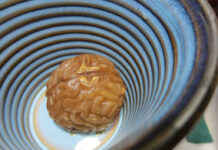Mental Health Apps May Lead to Overdiagnosis, Study Finds
A new study finds that mental health apps promote a one-dimensional view of mental health.
Study Explores Pain Assessment for Medically Complex, Nonverbal Children
To what extent are healthcare providers equipped to assess nuance in the experiences of pain among nonverbal children?
Restricting Pharma Reps Contact with Docs Decreases Prescriptions
Implementing policies that regulate pharmaceutical sales representatives’ interaction with physicians may reduce prescription of promoted drugs.
Born Addicted to Valium: Understanding a Lifetime of Symptoms
Withdrawal felt like: evil feeding on my soul, my spirit being tortured, not being able to feel love, constantly feeling like I was falling in a dark tunnel, and wanting to get out of my body.
Trying to Fly Above—An Example of Sequencity
I consider synchronicity and sequencity connections to be gifts. The meaning involved is often much deeper and more personal than other people will recognize.
While Psychiatry Slept
You might ask, “But why are dreams so crucial to psychiatry?” I would tell you that they are the forgotten language of the psyche, composed of metaphor and symbol, simile and synecdoche. All who enter the world of non-consensus reality long for a physician trained to hear the patois of image.
A Faux Test for a Faux Disease Promoted by Real Psychiatrists
Influential psychiatrists recently called on the NHS to make a faux schizophrenia test available to patients and their families. What is most astounding about this is the complete lack of pretense. "We are so certain of our power and righteousness that we are going to tell you to your face that we are lying, and yet, we will still get our way."
Leading Psychiatrists Unwittingly Acknowledge Psychiatry Is a Religion, Not a Science
Leading figures in psychiatry acknowledge that DSM psychiatric diagnoses and the chemical imbalance theory of mental illness are not scientifically valid, but are useful fictions that help people manage their emotions and comply with their medication treatments.
Dr. George Atwood: Shattered Worlds, the Experience of Personal Annihilation
Dr. George Atwood has devoted a substantial part of his life to the study and treatment of what he refers to as ‘so-called psychosis’ and has authored or coauthored several books, including The Abyss of Madness published in 2011 and more than one hundred articles.
Brain Scans Cannot Differentiate Between Mental Health Conditions
A new study analyzing over 21,000 participants found that differences in activation of brain regions in different psychological “disorders” may have been overestimated, and confirms that there is still no brain scan capable of diagnosing a mental health concern.
Wunderink: Antipsychotics Can Be Tapered Safely Without Increasing Relapse Risk
Tapering antipsychotics slowly and with supported decision-making may improve care for patients with psychosis.
Unheard Voices: Carlton Brown
In the first installment of MIA's Unheard Voices series, Carlton Brown talks about his life, living on the streets, the psychiatric system, and survival.
Bridging Critical and Conceptual Psychiatry: An Interview with Awais Aftab
MIA’s Justin Karter interviews psychiatrist Awais Aftab about how “conceptual competence” uses philosophy to transform psychiatry.
Lost in Psychobabble? Cut Through the Jargon for Real Mental Clarity
The key to healing is to recognize that you are not dealing with a broken brain, but unlearning survival habits that no longer serve you.
It’s a No-Brainer: Living Proof We Are More Than Our Parts
Terms like “reward systems,” “emotion centers,” and “decision circuits” suggest precision. But these aren’t discoveries—they’re metaphors.
Systemic Violence and the Mental Health Industrial Complex
A recent paper, by Dr. Eric Greene, builds upon critiques of the biomedical model and illustrates how the mental health industrial complex overmedicates, stigmatizes,...
Fighting the Suppression of Dissent: A Guidebook for Those Who Refuse to Conform
Political, educational, and mental health fields are joining forces in ever more powerful authoritarian rule. The DSM, proclaimed to be a scientific guidebook, is little more than a political instrument used to control undesirable behaviors and experiences. Who will fight for our rights when everybody is tranquilized into conformity?
Why Increased Psychological Freedom Should be the Main Goal of Psychotherapy
Insight into the childhood roots of recurring interpersonal problems and better expressive mastery of primal emotions are cornerstones of effective psychotherapy.
A Bridge Over Troubled Water: What’s This About Being a Hopeless Reformer?
My role within the Mad in America community has been to provide a perspective largely conditioned by six years as a state mental health commissioner. I believe that, realistically speaking, psychiatry isn't going away. Cultures in everything from state hospitals, to community-based inpatient programs, to crisis services, to outpatient settings don't change quickly.
Researchers Call for Integration of Social Risk Factors in Mental Health Care
An understanding of the importance of social risk factors in mental health outcomes has professionals calling for better models and integrated treatments.
Critical Psychiatry Textbook, Chapter 8: Depression and Mania (Affective Disorders) (Part Three)
On the latest fad, ketamine, and how depression pills cause dependence and withdrawal.
A Tribute to Dr. Dean K. Brooks: The Fire Still Burns
Stories of a state hospital leader who challenged the mental health system by placing patients as the most important people: Dr. Dean K. Brooks of Oregon State Hospital.
Suicidal Thoughts, Psychiatric Diagnosis, and What Really Helps: Part One
This piece is the first of a two-part essay about suicide, diagnosis, what doesn't help, and what does help. This part is about suicide, diagnosis, and some of what fails to help.
Akathisia: Historical Perspective for Healing
I'm still tapering from medications, but I am better, which is how I know recovery is possible. Understanding the systems that were impacted by medications was an essential piece of the puzzle.
Lithium No Better Than Placebo for Preventing Suicide Attempts
A trial in veterans who had survived a previous suicide attempt was stopped early because the drug was found to be no better than a placebo.

































